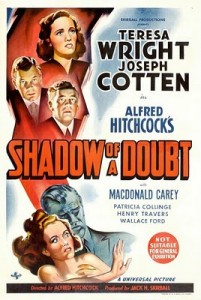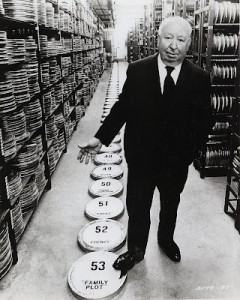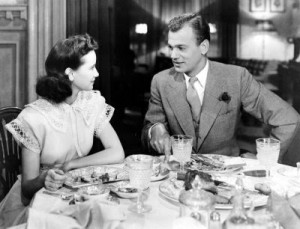Shadow of a Doubt ***** (1943, Teresa Wright, Joseph Cotten, Macdonald Carey, Henry Travers, Hume Cronyn) – Classic Movie Review 231

Taut, tense and bristling with pent-up sexual frisson, Alfred Hitchcock’s 1943 dark little gem is one of his cleverest, most inspired movies.
Joseph Cotten enjoys one of his finest roles as the smooth and sophisticated, kindly-seeming Uncle Charlie, who arrives in Santa Rosa, California, to stay with his bored, excitement-craving niece Young Charlie (Teresa Wright). She is actually Charlotte, odd that she has taken the same name as her uncle, and she is totally enrapt in her admiration for him.
But then Uncle Charlie charms everybody, the ladies at the club, and the men at the bank. However, the honeymoon is soon over. Young Charlie starts to notice her uncle seems to be indulging in some odd pieces of behaviour. She gets understandably a bit suspicious when she finds him cutting out a story in the newspaper about a man marrying then murdering rich widows. Two strangers come sniffing around and, bit by bit, she gradually comes to realise that he is the notorious Merry Widow Killer trying to escape detectives dogging him.
And then it isn’t long before Young Charlie’s suspicions about her uncle are shared by an investigator, Jack Graham (Macdonald Carey).
Based on a story by Gordon McDonnell, who was Oscar nominated for Best Original Story, this intense psychological thriller provides a sizzling, searing look under the apparently tranquil surface of a typical US small town, in the way that Blue Velvet or American Beauty do. Passions are rising almost unheeded. Incestuous feelings are felt, and felt strongly. There’s lust in the small town. And a possibly now a murderer too. Something’s got to give.
At the core of Hitchcock’s movie is the tremendous invaluable asset that there is a witty, incisive and chilling script by the playwright Thornton Wilder, Sally Benson, and Hitch’s wife Alma Reville, adapting McDonnell’s story. The movie is a twisted character study, more like Rebecca or The Lodger than Psycho, hardly even a thriller at all.
But master craftsman and super technician Hitchcock ensures that it has also got a huge, long build-up of tension and a great surface to it, as well as the right actors to carry it off. Cotten is wonderfully menacing and ambiguous. Wright provides all the right notes of love and fear.
The movie is enlivened by Joseph Valentine’s gleaming razor-sharp black and white cinematography, an impressive score by Dimitri Tiomkin and sparkling support playing from a fine ensemble cast of favourites. There is especially good work from Henry Travers as Charlotte’s father and Hume Cronyn as the family’s, who gossip merrily away about gory killings in best Hitchcock black-comedy fashion. Some comedy relief is very helpful to the movie, as its tone is surprisingly dark and bleak. Refreshingly so, it takes no prisoners.
One of Hitch’s favourites, this supremely polished and stylish movie is sometimes overshadowed by his more obviously commercial and exuberant thrillers, but this is certainly one of his real deals alright.
Hitchcock said: ‘I wouldn’t say it is my favourite picture. If I’ve given that impression, it’s probably because I feel that there is here something our friends the plausibles and logicians cannot complain about.’
Also in the cast are Patricia Collinge, Wallace Ford, Janet Shaw, Estelle Jewell, Eily Malyon, Ethel Griffies, Clarence Muse, Frances Carson, Charlie Bates, Edna May Wonacott, Irving Bacon, Minerva Urecal, Isabel Randolph, Earle S Dewey, Edward Fielding, Sarah Edwards, Vaughn Glaser and Virginia Brissac.
It was remade for TV in 1991, with Mark Harmon, Diane Ladd, Shirley Knight and Hitch’s own star Tippi Hedren.
© Derek Winnert 2013 Classic Movie Review 231 derekwinnert.com








